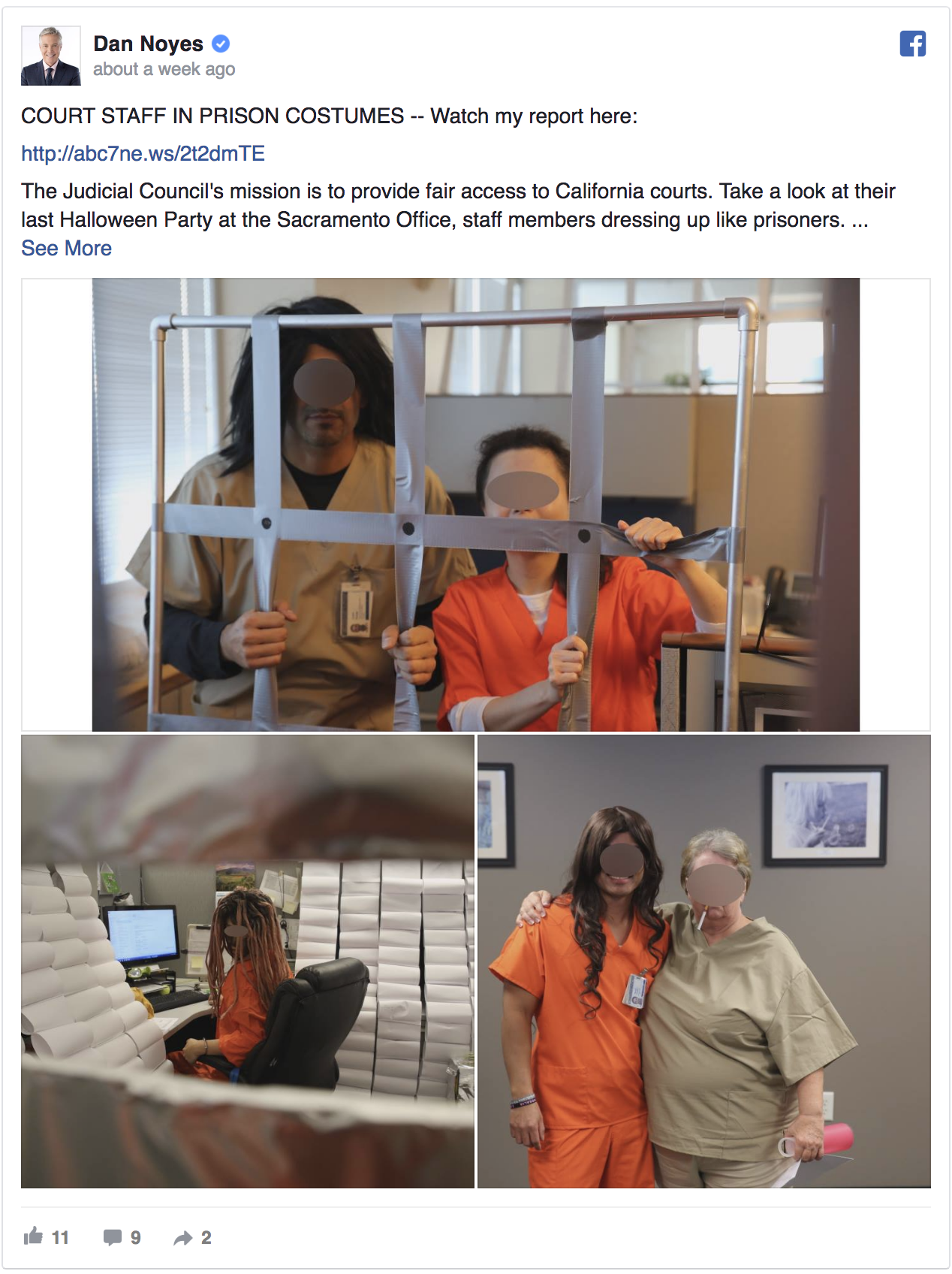SACRAMENTO, Calif. (KGO) — The NAACP is demanding an apology from the Judicial Council, the policy-making body for California courts, after the I-Team obtained photos of a costume party at its Sacramento office.
The photos of that party and the council’s handling of black history month are raising complaints of racial bias in this important group, charged with ensuring fair access to the courts.
Michael Roosevelt is a 20-year employee at the Judicial Council. Its mission — to advance “the consistent, impartial, independent, and accessible administration of justice”. Roosevelt was hired to develop bias education programs for court employees and judges, and he was shocked by photos of a Halloween party at the Judicial Council’s Sacramento office last year.
Roosevelt told Dan Noyes in an interview, “Here you’ve got the image of people who work for and support the courts who are dressed in prison garb, darkening their faces, depicting a prison setting where disproportionately those people who are incarcerated are people of color.”
The pictures posted on the council’s intranet show employees who turned their cubicles into prison cells, a guard standing watch, someone wearing dread locks and a Hannibal Lechter mask in a padded cell, others painting their faces. Roosevelt says it all sends a dangerous message: “Bad people, black people, dark people, people with locks, they are to be feared.”
Dan Noyes added, “Feared and ridiculed.”
Roosevelt agreed, “Feared and ridiculed.”
The employees’ depiction of the TV show “Orange is the New Black” won the “best decorations award” at the party, but Roosevelt says there’s nothing funny about men in wigs apparently imitating a transgender actress from the program.
“If you are a person who is transgender and in prison,” says Roosevelt, “your life is in jeopardy.”
The I-Team requested an interview with the chair of the Judicial Council, Chief Justice Tani Cantil-Sakauye, but her spokesperson only emailed a statement that reads in part, “The Judicial Council’s executive leadership and management does not condone any activity that diminishes the value of individuals or the ideals of our justice system.”
When the complaints came in, the council removed the photos from the intranet, directed the supervisor involved to ensure employees use good judgment, and added, “a course on diversity/respect” for employees.
That’s not enough for the NAACP. President of the group’s San Francisco Chapter, Rev. Amos Brown, told the I-Team, “We will call for an apology”
Dan Noyes showed the pictures to Reverend Brown; he’s also on the board of the national NAACP. Brown calls the party insensitive and insulting.
“It does concern me because they have adopted in their minds, their spirits, the prison culture,” said Brown. “They don’t see these prisoners as being human beings, they see it as being a fun thing.”
The NAACP is demanding an apology from the Judicial Council, the policy-making body for California courts.
Michael Roosevelt tells the I-Team the Judicial Council mishandled this year’s Black History Month celebration. The event committee voted to feature the Black Panther Party.
He said, “The reaction to the theme was the council could not support that theme.”
Roosevelt says the council pulled funding for the month of events — about 16-hundred dollars, canceled the regular field trip using a state-owned van, and relegated the program to the basement of the Federal Building when in years past they had prime space.
Shauna Gillespie-Ford is a probate court investigator who has served on the Black History Month planning committee, and she told the I-Team, “It feels discriminatory, it feels racist.”
Gillespie Ford is upset the council would take a stand against remembering the Black Panther Party — both the good it did, such as the “free breakfast for children” program and community health clinics, and the sometimes violent altercations with police.
“It’s part of the history,” said Gillespie-Ford. “And I don’t know why it should be ignored or overlooked or disregarded.”
The Black History Month committee also involves other state and local employees who work in the area. The Judicial Council defended their actions in an email to me, saying they “cannot, and must not, appear to lend support to a political philosophy or group.”

From ABC news, full story here: http://abc7news.com/2207223/